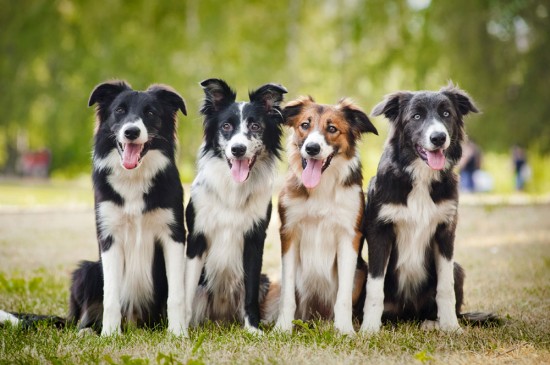All Dog Breeds have that look that translates obviously as "Dinner Time" or "That was a little short on quantity and a little more won't go astray." Be aware that you may be slowly killing your much beloved pet.
Dog Food ?the healthy and not so healthy.
Like us, dogs love their food. We humans love the taste sensations of dinner and like to sit and savior the meals and share our thoughts or spices, preparation, and the cleaning up. To us it can be a very social event.
But dogs are dogs; they don抰 have the same number of taste buds as we do for starters and if there is another dog near the dinner table then they will attempt make sure that their food will not be shared with them. Dogs have evolved to eat whatever is available and eat it quickly.
Dogs are basically meat eaters. Meat, fat, and bone are the basis of life for dogs, and contain all the essential amino acids, essential fatty acids, vitamins, and minerals they need. Clean water, of course is the essential element of life. Fibre is also needed to promote good digestion and solid stools.
Dogs eat funny stuff too; some like to eat grass and theories abound about why this is, from nutrient intake to sore stomachs. Some dogs like to eat poop; an obviously disgusting habit for humans, but quite acceptable to dogs. Once again many theories abound why they do this (officially it's called coprophagia). An article at Woofahs.com lists 20 reasons why a dog could eat poop.
Which Dog Food is Really the Best?
The best dog food manufacturers only use nutrients fit for human consumption, their products are made to fixed formulas and the ingredients are always the same. The cheaper the food, the more variance there is in the product. Your dog may have a cast iron stomach, a hardy constitution, and few taste buds and thus be able to handle the cheaper varieties. But it is important to know that if they are sickly, have runny stools, or turn their back on the food then you may have to experiment.
Read the label on each dog food product. They may be hard to understand but you may be able to select something which actually has some protein contained within rather than just all chemicals.
Always check with the breeder of the dog for their recommendations if you can. Your local Pet Supplies Store owner may be able to help and there is plenty of research available on the Internet. Some Dog Breeds may have problems with certain types of food and the best manufacturers have carried out extensive trials on a wide range of breeds.
TYPES OF DOG FOOD
DRY DOG FOOD
The convenience of all-in-one dry food makes it a very popular choice. These foods are cooked under pressure then dried. Fat is then sprayed on the particles for palatability. As the fat can go rancid, this food needs to be stored properly; preferably in a sealed plastic container away from light, humidity and oxygen.
WET DOG FOOD
Canned dog food is also a popular choice. You need to be aware that however highly palatable the food may be for the dog, it provides no exercise for the teeth and gums and is apt to spoil if it is not eaten immediately. An easy and popular solution for this is to mix dry dog food and wet food. The dog will also appreciate this.
HOME COOKING
If you have the time to cook special food for your dog make sure you are proving a balanced diet containing the essentials of life. Dogs are omnivores and eat a variety of foods. Meat and three vegetables is a good start; then add some rice, poultry, liver, yogurt, fish (watch the bones), cooked or raw eggs, small bits of fruit, some vegetables (not onion) and you are on the way to a very happy, very healthy dog.
Don抰 rely solely on food scraps after your meal, as you may well be under feeding or over feeding the dog. The dog knows what it likes, so if you see peas and broccoli left over in his bowl ?that抯 what he doesn抰 like ?so you may have to mash it up if you feel the dog would benefit.
TAKE CARE
Avoid tofu and other bean products as food sources as these products stimulate mucus production and may increase the risk of stomach bloat ?this can be life threatening.
Avoid dairy products ?cows milk can cause diarrhoea in many dogs.
Avoid chocolate ?In large amounts, chocolate is actually harmful to all Dog Breeds ?use carob bars as these look like chocolate, feel like chocolate, and taste like chocolate but will cause no harm.
BONES
Dogs love bones, but most vets will advise that you do not give your dog a cooked bone as slivers may break off and cause damage to the gums and stomach. Bones can also cause cracked teeth and chipped enamel. But ? Dogs Love Bones!
Introduce bones to puppies as early as possible so that they learn to handle them responsibly. Offer only the hardest bones that aren抰 easily cracked and here beef chins and knuckles are good. Don抰 let your dog come to believe that he now owns the bone. This possessiveness may lead to aggression if you need to move the bone out of the way to mow the lawn.
Never feed your dog cooked chicken bones, but they love raw chicken bones and raw is fine.
CAT FOOD
Dogs love cat food because this food contains more protein, which cats need. Dogs don抰 need that amount of protein and it becomes unhealthy to feed your dog cat food.
VEGAN
Dogs will survive on a vegetarian diet, but he won抰 be a happy dog. You may love the vegetarian diet and hold strong views on the subject, but to foist human views on a dog is a little unfair. If you must, consult a canine nutritionist about how to create a balanced diet for your dog. You will kill a cat on a vegetarian diet, as they must eat meat to live.
BARF (Bones and Raw Food)
The BARF diet could fill an entire article. Basically the proponents say that the raw meat, raw bones and finely ground raw vegetables and fruit keep dogs healthier because it reflects more accurately what wild dogs eat.
Some other good points are:
- Very palatable
- Raw bones keep dogs?teeth clean
- Free of preservatives and additives
- Rewarding for owner if the dogs thrive on the diet.
Some Cons:
- Time consuming to prepare
- Inconvenient when travelling
- Parasites could be present in raw meat
- Vegetables and fruits must be finely ground to be digestible
- Frozen options take up a lot of space
Conclusion: My advice on these foods: Vary them, my Maltese thrives on a variety of dry food, wet food, home-cooked food, bones, raw and cooked meat, and raw chicken necks.

 Humans Are Unique Project
Humans Are Unique Project
 Keeping Collies Happy & Healthy
Keeping Collies H
Keeping Collies Happy & Healthy
Keeping Collies H
 Natural Treatment for Pet Cataracts
Pets are considered part of the family. When t
Natural Treatment for Pet Cataracts
Pets are considered part of the family. When t
 Is A Terrier The Right Breed For You?
Is A Terrier The
Is A Terrier The Right Breed For You?
Is A Terrier The
 Choose the best horse accessories to enjoy the riding
Choose the best horse accessories to enjoy the riding
Choose the best horse accessories to enjoy the riding
Choose the best horse accessories to enjoy the riding